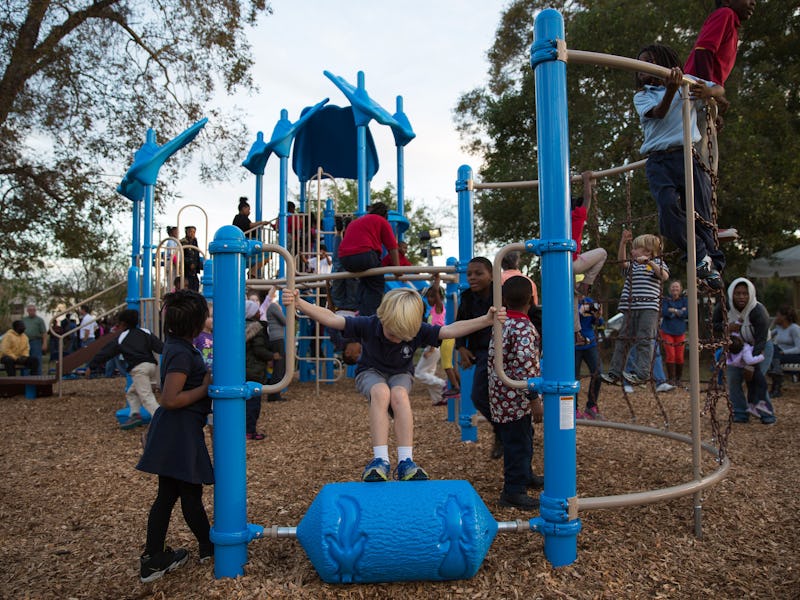If Recess Coaches Are Right, We Misused the Playground
The growing demand for "recess coaches" reflects the needs of today's kids, not the failures of past generations.

Unbeknownst to the childless or parents of teens, “recess coaches” are becoming a playground institution, like empowered monkey bars or an opinionated slide. Their job? Facilitating play and schooling kids on how to play better. Workers for nonprofits like Playworks are trying to transform school culture by teaching fair and inclusive gameplay. They claim that kids welcome the change, but Playworks’ official mission statement states that playtime is “often a period of chaos or conflict,” landing kids in detention or, worse, the nurse’s office, where they can’t reap the benefits of physical activity and social interaction. To most, this is a banal observation: Of course recess includes mayhem; mayhem is what kids are best at. This reaction is born of personal experience, but it may not be supported by evidence.
For Dr. Rebecca London, a research professor at UCSC’s Education Department, who has led studies on Playworks’ efficacy, mayhem is a nuanced thing. It’s important to give kids the space and freedom to be creative and decompress, she says, but also important to make sure a free-for-all approach doesn’t leave kids out. The goal is to avoid situations that lead to bullying, violence, or exclusion, experiences adults had as children.
“In creating and supporting a great recess, it’s not about eliminating free play or mandating structured play,” London tells Inverse. “It’s about helping schools create an environment where every child has a supported choice.”
Even a game as simple as four square has potential for conflict because kids don’t always agree on the rules. “There are 20 different ways you could set up those games,” London says. Rather than dictate how the game works, recess coaches help kids establish their own normal sets of rules so they can spend more time playing and less time butting heads. When kids are excluded, coaches demonstrate that rules can be adjusted. Heated arguments are settled with games of rock, paper, scissors.
It’s easy for adults to scoff at these interventions. Aren’t we living proof that kids don’t need the help? Perhaps, but our adequacy isn’t tantamount to success and play doesn’t need to be consistent over time. London says children have become so used to structured activities and sports that they don’t know what to do when presented with free time and an empty schoolyard. Making matters harder, some schools, notably many around Chicago, have eliminated recess altogether. While children of previous generations probably could have used recess coaches to manage inclusivity, today’s kids need them simply because they don’t know how recess works.
The disappearance of recess prompted the American Academy of Pediatrics to issue an official statement on the importance of play last year. For Dr. Robert Murray, the president-elect of the AAP’s Ohio Chapter and author of the report, the issue isn’t what kids are doing during recess. It’s whether they’re having recess at all. Older generations at least got that part right.
“We did good by letting kids play longer, with fewer rules,” Murray tells Inverse. “Developmental pediatricians feel like we have gotten away as a society from free play and allowing kids to be bored and make up things.” Giving kids a moment to disengage helps them consolidate what they’ve learned, he says, citing the AAP’s research on the link between academics and downtime. By taking that away from them to cram in even more teaching time, educators are wasting their own time and kids’.
Murray points out that his research has further-reaching implications. What are adults, after all, but overgrown kids? “We give ourselves breaks to do what we’re not allowing kids to do,” that is, the coffee runs and office conversations that keep us barely sane at work. “Adults do that without thinking about it as a recess break.”
As more schools adopt holistic approaches to education and the AAP’s research garners support from the medical and education communities, Murray, like London, is optimistic about the future of play. That’s not to say he was ever pessimistic about the past; kids today are simply different beasts. But regardless of what year they’re born, kids will want to play. The question, going forward, is whether they’ll know how.